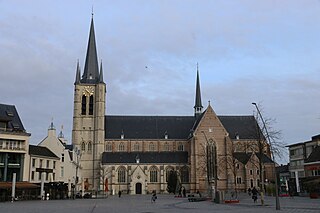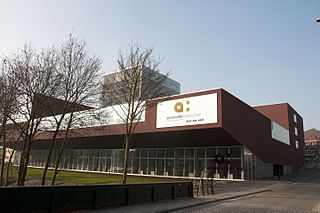External links
51°9′39.79″N4°57′40.03″E / 51.1610528°N 4.9611194°E
The Katholieke Hogeschool Kempen (KH Kempen, KHK) was a university-college where students could obtain a professional bachelor's degree (3 year education) in several domains. There was also the opportunity to study for a master's degree in engineering (4 years) in agriculture (bioscience) or an engineering degree in electronics. In 2012 the institution fused with Lessius Mechelen and Lessius Antwerp and now goes by under the name: Thomas More University-College.
The institution was founded in 1995 at the merger of six Catholic higher education institutes of the Campine region of the province of Antwerp (Belgium). The Hoger Instituut voor Economische Wetenschappen, the Katholieke Industriële Hogeschool der Kempen, the Hoger Instituut voor Technische Wetenschappen, the Hoger Instituut voor Sociale Studies and the Hoger Instituut voor Technische en Paramedische Wetenschappen created the Hoger Instituut der Kempen (HIK) in Geel. The HIK merged with the higher education department of the Sint-Aloysiusinstituut voor Verpleegkunde in Lier, the Pedagogisch Hoger Onderwijs Kardinaal Van Roey-Instituut in Vorselaar, the Pedagogisch Hoger Instituut Heilig Graf and the Economische Hogeschool in Turnhout. The history of its predecessors dates back for more than 50 years. In 2002, the KHK joined in an association with the Katholieke Universiteit Leuven, together with 11 other Catholic institutions and the Catholic University of Brussels.
The university-college changed it's name in 2012 to Thomas More Kempen. The institution now sails under the Thomas More brand-name.
The headquarters of the KHK are located in the city of Geel with several departments spread over the Campine, region of the province of Antwerp of Belgium.
The institute consists of eleven departments. Six of its departments are located in Geel, while three departments are located in Turnhout and one in Lier and Vorselaar.
51°9′39.79″N4°57′40.03″E / 51.1610528°N 4.9611194°E

Antwerp Province, between 1815 and 1830 known as Central Brabant, is the northernmost province both of the Flemish Region, also called Flanders, and of Belgium. It borders on the North Brabant province of the Netherlands to the north and the Belgian provinces of Limburg, Flemish Brabant and East Flanders. Its capital is Antwerp, which includes the Port of Antwerp, the second-largest seaport in Europe. It has an area of 2,876 km2 (1,110 sq mi), and with over 1.92 million inhabitants as of January 2024, is the country's most populous province. The province consists of three arrondissements: Antwerp, Mechelen and Turnhout. The eastern part of the province comprises the main part of the Campine region.

Geel is a city and municipality located in the Belgian province of Antwerp, which acquired city status in the 1980s. It comprises Central-Geel which is constituted of 4 old parishes a/o towns: Sint-Amand, Sint-Dimpna, Holven and Elsum. Further on around the center are the parish-towns of Ten Aard (N), Bel (E), Winkelomheide (SE), Stelen, Oosterlo and Zammel (S), Punt (SW) and Larum (W). In 2021, Geel had a total population of 40,781. The total area is 109.85 km2 (42 sq mi). Geel’s patron saint, the Irish Saint Dymphna, inspired the town’s pioneering de-institutionalized method of care for the mentally ill.

The Vrije Universiteit Brussel is a Dutch and English-speaking research university in Brussels, Belgium. It has four campuses: Brussels Humanities, Science and Engineering Campus, Brussels Health Campus, Brussels Technology Campus and Brussels Photonics Campus.
Tilburg University is a public research university specializing in the social and behavioral sciences, economics, law, business sciences, theology and humanities, located in Tilburg in the southern part of the Netherlands.

The Flemish Diamond is the Flemish reference to a network of four metropolitan areas in Belgium, three of which are in the central provinces of Flanders, together with the Brussels-Capital Region. It consists of four agglomerations which form the four corners of an abstract diamond shape: Brussels, Ghent, Antwerp and Leuven.
The Katholieke Universiteit Leuven Associatie Kortrijk, or Kulak for short, is a university satellite campus of the KU Leuven in the city of Kortrijk (Courtrai) in the Belgian province of West Flanders and is therefore also officially a Dutch-speaking institution.

The Royal Carillon School "Jef Denyn" is a music school in Mechelen, Belgium, that specializes in the carillon. It is the first and largest carillon school in the world. The Belgian government defines it as an "International Higher Institute for the Carillon Arts under the High Protection of Her Majesty Queen Fabiola". The school has trained many of the foremost carillonneurs of the twentieth and twenty-first centuries and houses a rich archive and library.

The Institute of Tropical Medicine is one of the world's leading institutes for training and research in tropical medicine and the organisation of health care in developing countries. Located in Antwerp, Belgium, ITM also delivers outpatient, clinical and preventive services in tropical pathologies and sexually transmitted diseases.
The education in the Flemish Community covers the Dutch-speaking part of Belgium and consists of three networks (netten): government-provided education (gemeenschapsonderwijs), subsidized public schools and subsidized free schools.
Science and technology in Flanders, being the Flemish Community and more specifically the northern region of Belgium (Europe), is well developed with the presence of several universities and research institutes. These are strongly spread over all Flemish cities, from Kortrijk and Bruges in the Western side, over Ghent as a major university center alongside Antwerp, Brussels and Leuven to Hasselt and Diepenbeek in the Eastern side.
The Campus Blairon is a business incubator, education site, local government site, medical post and a seminar centre located in Turnhout in the campine region of the Antwerp province (Belgium). Both the Artesis Hogeschool Antwerpen and the Katholieke Hogeschool Kempen are located on the Campus.

Lessius was a university college in Belgium named after the Jesuit economist Leonardus Lessius. It was founded in 2000 from the merger of two Catholic institutions of higher education in the city of Antwerp, and was later joined by another constituent college in Mechelen, which became the Lessius Mechelen campus. This gave Lessius several campuses in Antwerp and Mechelen. In 2012, Lessius merged with Katholieke Hogeschool Kempen to form Thomas More University college. This institute of higher education is a member of the K.U.Leuven Association.

KU Leuven is a Catholic research university in the city of Leuven, Belgium. Founded in 1425, it is the oldest university in Belgium and the oldest university in the Low Countries.
Veterinary auxiliaries in Wallonia are known as ASV—"assistantes veterinaires". There is a single state-recognized program in Belgium organized by la Communauté Française de Belgique. This is a two-year program offered by l'Institut d'Enseignement de Promotion Sociale de la Communauté Française at Jupille. This program is still in its infancy, graduating its first class in June 2011. There are non-state sanctioned programs offered in private institutions in Flanders. Two of these programs, that offered at Katholieke Hogeschool Kempen in Geel and VIVES University of Applied Sciences in Roeselare, have received full accreditation from ACOVENE. At this time there is not a national organization representing veterinary assistants in Belgium.. There are regional organisations, like BaDiZo in Flanders.

The Artevelde University of Applied Sciences is a Catholic University of Applied Sciences in the city of Ghent, Belgium. The Artevelde University of Applied sciences offers a diverse range of bachelor-programs, bachelor-after-bachelor-programs, postgraduate-programs and schoolings.

AP University of Applied Sciences and Arts Antwerp, founded in 2012, is a non-profit public higher education institution located in the city of Antwerp and created as a merger between Artesis Hogeschool Antwerpen and Plantijn Hogeschool [1] [2].

The Colonial University of Belgium was an institute of higher education located in Antwerp. Founded in 1920, the institute was established to prepare students for a careers as colonial functionaries in the Belgian Congo and Ruanda-Urundi. It was renamed the University Institute of Overseas Territories in 1949. It was dissolved in 1962.